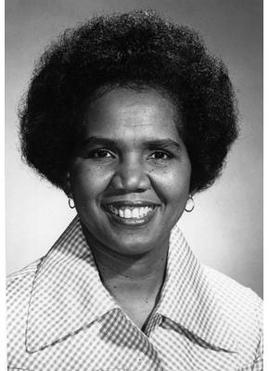Rosemary Brown (Canadian politician) facts for kids
Quick facts for kids
Rosemary Brown
|
|
|---|---|
 |
|
| MLA for Vancouver-Burrard | |
| In office 1972–1979 Serving with Norman Levi
|
|
| Preceded by | Harold James Merilees Bert Price |
| Succeeded by | riding dissolved |
| MLA for Burnaby-Edmonds | |
| In office 1979–1986 |
|
| Preceded by | Raymond Loewen |
| Succeeded by | David Mercier |
| Personal details | |
| Born |
Rosemary Wedderburn
June 17, 1930 Kingston, Jamaica |
| Died | April 26, 2003 (aged 72) Vancouver, British Columbia |
| Political party | New Democratic |
| Education | McGill University (BA) University of British Columbia (MA) |
Rosemary Brown PC OC OBC (born Wedderburn; June 17, 1930 – April 26, 2003) was an important Canadian politician. She made history as the first Black woman to be elected to a provincial government in British Columbia. She spent her life fighting for fairness and equality for everyone.
Contents
Early Life and Challenges
Rosemary Brown was born in Kingston, Jamaica, in 1930. She moved to Canada in 1951 to go to university. She studied at McGill University and later earned a Master's degree in Social Work from the University of British Columbia.
While studying, she faced a lot of unfair treatment because of her race and gender. This unfairness inspired her to become a leader. She wanted to fight against racism and sexism. In 1956, she helped start the British Columbia Association for the Advancement of Coloured People (BCAACP). This group worked to improve housing, jobs, and human rights for people of colour.
A Trailblazing Political Career
Rosemary Brown served as a Member of the Legislative Assembly (MLA) in the British Columbia legislature. She was part of the New Democratic Party from 1972 to 1986. This made her the first Black Canadian woman ever elected to a Canadian provincial legislature.
During her time as an MLA, she worked hard for minority groups in Canada. She helped change laws to make sure everyone was treated equally. She focused on improving services for older people, those in need, immigrants, and people with disabilities. She also helped pass laws that stopped discrimination based on race or gender.
In 1975, Rosemary Brown made history again. She became the first Black woman to run for the leader of a major Canadian political party. She finished in a strong second place in the 1975 New Democratic Party leadership election.
After leaving politics, she became a professor of women's studies at Simon Fraser University. In 1993, she was chosen to be the Chief Commissioner of the Ontario Human Rights Commission. She served in this important role until 1996.
Honours and Recognition
Rosemary Brown received many awards and honours for her work:
- National Black Coalition Award, 1972
- United Nations Human Rights Fellowship, 1973
- YWCA Woman of Distinction Award, 1989
- Order of British Columbia, 1995 (a high honour from British Columbia)
- Order of Canada, 1996 (one of Canada's highest honours)
- Government of Jamaica Commander of the Order of Distinction, 2001
- Canadian Labour Congress Award for Outstanding Service to Humanity, 2002
- 15 honorary doctorate degrees from Canadian Universities, including UBC in 1995.
Later Life and Legacy
Rosemary Brown passed away from a heart attack in Vancouver, British Columbia, in 2003. She was 72 years old.
Her impact continues to be remembered:
- Canada Post honoured her by featuring her on a Canadian postage stamp. This stamp was released on February 2, 2009.
- On June 17, 2005, a park in Vancouver-Burrard was named after her. This was the area she represented as an MLA.
- In 2021, a new public school in Ontario was named Rosemary Brown Public School.
- A recreation centre in Burnaby, British Columbia, is also being built and will be named after her.
 | Calvin Brent |
 | Walter T. Bailey |
 | Martha Cassell Thompson |
 | Alberta Jeannette Cassell |

